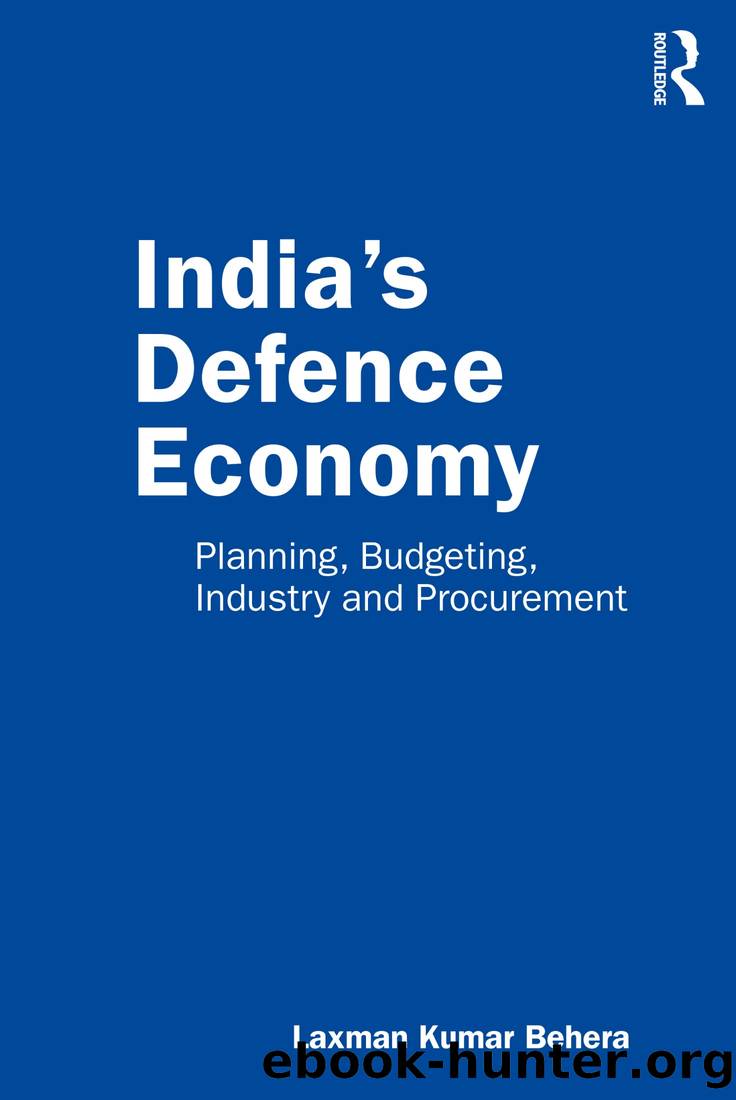India's Defence Economy: Planning, Budgeting, Industry and Procurement by Laxman Kumar Behera

Author:Laxman Kumar Behera [Behera, Laxman Kumar]
Language: eng
Format: epub
Tags: International Relations, Public Policy, National, Industries, Strategic Planning, Political Science, Military Policy, American Government, Security (National & International), Management, General, Business & Economics
ISBN: 9781000214512
Google: mkX8DwAAQBAJ
Goodreads: 53475480
Publisher: Routledge Chapman & Hall
Published: 2020-10-30T00:00:00+00:00
DRDOâs monopoly over defence R&D
One of the unique features in Indiaâs defence industrialisation process has been the near monopoly of R&D by the DRDO, with the industry and academia undertaking very little R&D on defence. This began with the establishment of the DRDO in 1958 and perpetuated ever since with the growth of the organisation. The dependence on DRDO for technology has, however, not yielded the desired results. The DRDO, despite having a large pool of scientists/engineers and over 50 labs and establishments, has been beset with many problems leading to failures and cost and time overruns in the projects undertaken. This, combined with lack of R&D in industry and academia, has compelled the country to source technology from outside, leading to a vicious circle where initial import leads to another in a successive fashion.
Compared to India, other advanced defence manufacturing countries encourage R&D as diverse sources that include dedicated research institutes, universities and industries. The model followed by many of these countries is one of R&D management rather than executing it through one agency. For instance, the Defence Advanced Research Projects Agency (DARPA) of the United States, which has been at the heart of the several radical innovations including in the areas of stealth, Internet, Global Positioning System (GPS) and Unmanned Aerial Vehicle (UAV), does not undertake R&D on its own. In fact, DARPA does not own a single lab on its own. Rather, it identifies talent and idea from industry, academia, government laboratories and individuals, and awards R&D contracts to be executed on typical time scale of three to five years. DARPAâs role is limited to shortlisting of projects and managing programmes, which it does through a 140-odd programme managers.55
Among other countries which are successful in cutting-edge innovation, Israel offers test case worth emulating. The giant stride that a small country like Israel has made is attributed to the Office of the Chief Scientist (OCS), which was set up in 1974 under the Ministry of Industry, Trade and Labour. The OCS is responsible for executing governmentâs R&D policy to foster innovation and promote technological entrepreneurship. Like the DARPA, the OCS also awards R&D contracts to diverse sources and manages them through small team that comprises 30 full-time employees. OCAâs core principle of R&D funding is not to subsidise R&D rather than partially mitigate risks through the governmentâs financial assistance. Interestingly, nearly one-fourth of OCSâs budget (in 2011) comes through the royalties paid back by companies, which have successfully converted R&D funding into marketable products.
In order to expand the R&D base, India also needs to have an institution similar to DARPA or OCS. For this to happen, there is a need to look beyond the DRDO. The post of Scientific Advisor to the Defence Minister, which was created by the Modi government as a separate post-independent of DRDOâs head but subsequently shelved after the first incumbent was elevated to head the organisation, is an ideal place to foster an organisation like the DARPA or OCS with a dedicated R&D fund at his disposal.
Download
This site does not store any files on its server. We only index and link to content provided by other sites. Please contact the content providers to delete copyright contents if any and email us, we'll remove relevant links or contents immediately.
The Secret History by Donna Tartt(19052)
The Social Justice Warrior Handbook by Lisa De Pasquale(12187)
Thirteen Reasons Why by Jay Asher(8893)
This Is How You Lose Her by Junot Diaz(6877)
Weapons of Math Destruction by Cathy O'Neil(6264)
Zero to One by Peter Thiel(5786)
Beartown by Fredrik Backman(5737)
The Myth of the Strong Leader by Archie Brown(5498)
The Fire Next Time by James Baldwin(5431)
How Democracies Die by Steven Levitsky & Daniel Ziblatt(5213)
Promise Me, Dad by Joe Biden(5141)
Stone's Rules by Roger Stone(5081)
A Higher Loyalty: Truth, Lies, and Leadership by James Comey(4952)
100 Deadly Skills by Clint Emerson(4920)
Rise and Kill First by Ronen Bergman(4779)
Secrecy World by Jake Bernstein(4741)
The David Icke Guide to the Global Conspiracy (and how to end it) by David Icke(4701)
The Farm by Tom Rob Smith(4502)
The Doomsday Machine by Daniel Ellsberg(4484)
